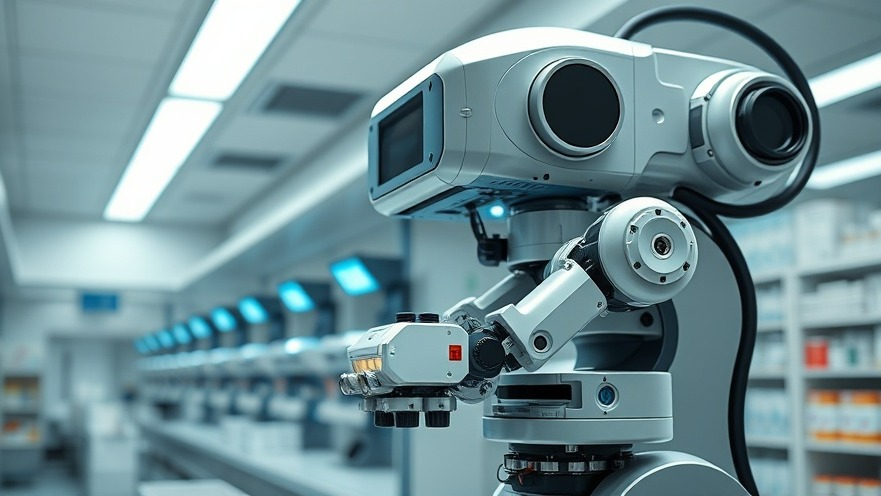
Revolutionizing Cancer Medication Preparation with Robotics
In the realm of healthcare, the integration of robots into hospital pharmacies marks a significant leap forward in the preparation of cancer medication. With pharmacy environments striving for increased safety and efficiency, a recent study by Tjerk Geersing, a hospital pharmacist, sheds light on how automation is not only a technological innovation but also a transformative shift in patient care.
Why Automation Matters in Cancer Drug Preparation
Cancer treatments often involve dangerous substances that require careful handling in sterile environments. Traditionally, these medications have been prepared manually by pharmacists in cleanrooms designed to minimize contamination. The introduction of robotic systems, such as the APOTECAchemo robot used in the OLVG hospital in the Netherlands, has changed the dynamics of medication preparation. The robot exhibits precision and accuracy, performing at par, if not better, than human counterparts.
Evaluating the Benefits: Quality, Efficiency, and Safety
Geersing's comprehensive evaluation focused on three critical components: product quality, time and cost efficiency, and safety. With rigorous testing, the study demonstrated that the robot preserves the same high standards in medication quality as manually prepared doses. Although the automation process might take longer initially, the efficiency gained through consistent workflow leads to an overall reduction in labor costs and time invested. Implementing a hybrid model of robotic and manual preparation allows pharmacies to increase output while significantly cutting labor costs by up to 2.5 times.
Environmental and Economic Advantages of Robotic Preparation
An added layer of benefit lies in the sustainability aspect of using robots for drug preparation. With a clear focus on reducing waste, these robotic systems optimize the use of medicine vials, allowing for less environmental impact and reduced costs, with estimates suggesting potential savings of around €45,000 annually for each drug. The minimized human error is a further incentive, ensuring safer preparation procedures that expose fewer staff members to hazardous materials.
Future Trends: Merging Technology and Health Regulations
As robotics play an increasingly significant role in pharmacies, the need for guidelines that support the safe implementation of automation becomes pronounced. The Dutch Health and Youth Care Inspectorate (IGJ) currently enforces strict regulations on medication preparation. However, there exists a gap as existing manual preparation standards do not necessarily cater to the capabilities of automation. The healthcare community must engage in dialogue to update and refine these regulatory guidelines to better align with modern practices.
Embracing Change: The Role of Health Practitioners
For concierge health practitioners, understanding the dynamics of automated pharmacy systems is crucial in navigating patient care pathways. Incorporating advanced technologies allows practitioners to advocate for enhanced treatments while ensuring safety and efficiency. Embracing these innovations not only reflects a commitment to quality care but also positions practitioners at the forefront of evolving medical solutions.
Actionable Insights for Healthcare Professionals
As we witness the transition towards automation in healthcare, several actionable insights emerge for practitioners:
Stay informed about the latest technologies impacting drug preparation and their implications for patient safety.
Advocate for regulatory reforms that accommodate automated processes to align safety standards with modern capabilities.
Educate patients and staff about the benefits of automated solutions in medication preparation, fostering acceptance and understanding.
In an era where technology and healthcare intersect, the ongoing integration of robots in pharmacies stands as a testament to improving patient care, raising quality standards, and promoting sustainability. The future of cancer drug preparation is not just about embracing technology; it’s about enhancing patient outcomes through innovation.
In summary, as healthcare continues to evolve, the robotics integration in hospital pharmacies serves as an exciting frontier that promises safer and more efficient medication preparation for cancer patients. Engaging with these advancements will empower healthcare professionals to make critical decisions that ultimately benefit the quality of care provided to patients.
 Add Row
Add Row  Add
Add 






Write A Comment